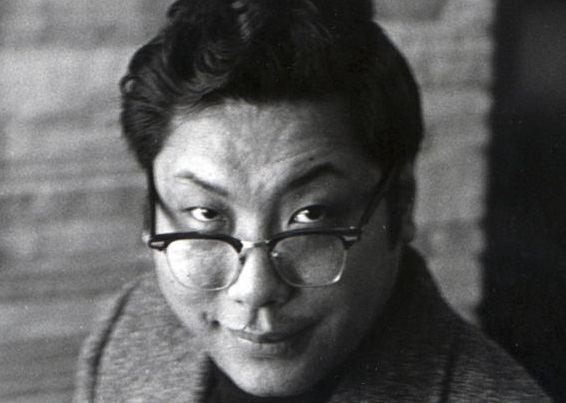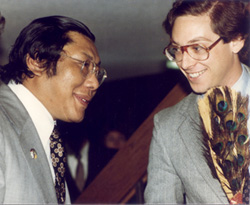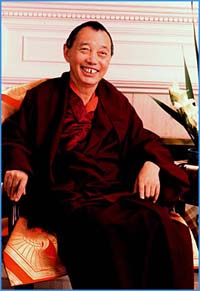
Valentine’s Day Edition
One day in Boulder, circa 1978, Larry Mermelstein had a very interesting conversation with Trungpa Rinpoche about relationships. Here for Valentine’s Day (okay, we’re a day late), is his account of that conversation.
Editor’s note: Thank you Larry for telling this story for Valentine’s Day.
Often when I was in Rinpoche’s presence, it was as a member of the Translation Committee, and there were almost always several other people in the room, including translators, consorts, board members, attendants, etc. So it was not as common for me to be alone with him. On this particular occasion, I was meeting with Rinpoche in his office, and it was just the two of us. I don’t remember what we were meeting about, but as we were finishing up our business, he turned to me and said, “So how’s your love life?”

I had recently broken up with my girlfriend. So as a matter of fact, my love life was not going very well at all, but I wasn’t particularly overwrought or distraught about it. I told him that my girlfriend and I were not seeing each other any more, and that seemed to be okay. I really had nothing further to say about my love life, but he seemed to want me to continue talking. So we chatted for awhile, and at some point early on in this little conversation, I said something like, “Sir, we often look to you as a reference point for our lives in general, but in this particular area, in terms of our relationships, I don’t really know how much we should do that.” I said this in a slightly tongue-in-cheek way, but I meant it as well. His relationships with women were very unusual, to say the least.
My little comment really got his attention, and he wanted me to fill in all the details, to describe to him what I saw as his unconventional behavior. This wasn’t difficult. Everyone knew that he was married, and yet he had relationships with many women, over time. There was certainly no hiding of that on his part, and no embarrassment. I think for most of us, his relationships with women were just an aspect of who he was. So our conversation went on, and I continued to describe his unconventional behavior. Eventually I (of all people) ran out of things to say. Meanwhile, in characteristic fashion, he had not said very much at all. After a short silence, I asked, “So, should we follow your example in terms of our relationships? Do you mean for us to do that?”
He said, “No. Absolutely not!”
I asked if he really meant that, and he said, “Oh yes. It would be suicidal for you to do what I do.”
I asked if this applied to all of his students, and he said, yes. So I said, “What about the Regent–from the Regent on down” And he said, “Yes. Absolutely suicidal. People should not try to copy me.”
I was overwhelmed and moved by his clarity. “Why don’t you tell people this? Why don’t you say something?”
He looked over his glasses at me and said,
“Why don’t you?”
So I’ve told this story to many people over the years. But this may be the first time it is being presented in a public forum.
Personally, I felt great and quite relieved after this exchange. I was relieved to know that I was not expected to follow or imitate his behavior in this regard, though I had never presumed that to be the case. For me, this conversation summed up something about his relationship with the phenomenal world that had always been hard for me to understand. Certainly, it was wonderful to be in his presence, and for the women who were his consorts, this was another aspect of their relationship with their teacher. From my own experience, as someone who was often around when he was with a consort, I always felt that his relationships with women were quite wonderful. He was always very respectful and caring. So I never had a problem with his actions or his behavior from an ethical point of view. But still, I think many of us wondered on some level what he was doing in this regard. He didn’t really explain that, but he certainly put to rest any confusion on my part that we were expected to imitate his behavior.
Some years later, Jamgon Kongtrul Rinpoche delivered a very similar message to our vajra sangha. He was perhaps the first Tibetan lama (other than the Vidyadhara) to actually talk to us directly in a somewhat critical fashion–kind but critical. Up to that point, the Tibetan teachers we had contact with, including His Holiness Karmapa and His Holiness Khyentse Rinpoche, gave wonderful teachings and blessings, and they greatly inspired our connection to dharma and a sense of lineage. But Jamgon Rinpoche spoke to us very directly, and his message was hard hitting. On this particular occasion, he was admonishing us for attempting to imitate Trungpa Rinpoche’s behavior. It was a powerful talk, an audience for sadhakas, I believe, and I think many of us were very inspired by what he had to say. He wasn’t criticizing Trungpa Rinpoche in any way. He was criticizing us for trying to copy Rinpoche, particularly with respect to drinking.
Several years after the Vidyadhara passed away, we received a wonderful teaching from Gyatrul Rinpoche on Vajrakilaya. I think some of his introductory comments [included below] are pertinent to this discussion. He was talking about what Trungpa Rinpoche had accomplished in the West.
Copyright 2007 by Larry Mermestein
Gyatrul Rinpoche on What Trungpa Rinpoche Gave Up

It really is Trungpa Rinpoche who brought the Kagyu doctrine to this country, and it is through his kindness that we now have the presence of this lineage in this country…
Especially you older students of Trungpa Rinpoche got caught by his fishhook. Those of you who like to smoke were attracted; those of you who like to drink were attracted; those of you who are party goers were very attracted. And he gave up a lot for you. What did he give up? His own reputation. He willingly accepted the criticism he received from his own people-and from other Americans, and from people in other countries-but he did all this so as to establish you on the path to liberation, which is where you are now. Would you be sitting here this evening if he hadn’t done that?
It is your responsibility to repay his kindness, which is not something he needs; it is something you need. You need to fulfill your connection—to connect with him, a being who works only for others. Now you have that same opportunity to maintain the dharma centers for the sole purpose of benefiting sentient beings. That is the gift that you’ve been given. [Rinpoche speaks in English:] But I’m not saying, “Keep the pot!”
Excerpted from “The Four Kilas of Vajrakilaya,” a talk by the Ven. Gyatrul Rinpoche at the Ngedon School, Karma Dzong, Boulder, Colorado, September 24, 1991, translated by Sangye Khandro. Published in The Vajrakilaya Sadhana Practice Manual, compiled by the Vajravairochana Translation Committee.
Comments
Rinpoche loved his students and said so. How many times did you hear him say “I love you” in a talk, or in passing. It always penetrated to the heart. Once he suddenly said to me “I think I love you.” and I asked him what that meant–what was love . He became quiet for a moment and then said …”Mutual Sympathy” and then he was quiet again. This is for us all. (anonymous 1976)
* * *
The most priceless answer I think we received was from HH Karmapa regarding imitating Rinpoche. HHK was giving an audience to students and was answering most questions at length in a grandfatherly way. The translator was being very attentive and one-pointed in his translation. When someone asked about Rinpoche’s drinking and if it was OK for us to imitate him HHK gave a curt brief statement that cracked up the translator. When the translator regained his composure, he said,
“His Holiness says, ‘Dogs shouldn’t imitate lions.”
Peace,
Jack Elias* * *
Once Tai Situ Rinpoche was giving an audience at Marpa House. I think it was 81 or 82. Someone asked him what is the best way to realize the Buddhist teachings, to become enlightened. Rinpoche said, .go on retreat and stay there until you are accomplished..
Taken somewhat aback one student raised his hand and said, .Your Eminence, in our lineage there are two ways, the monastic and the yogic. In the yogic, as is taught and manifested by the Vidyadhara, we can drink and smoke and even have lovers. This is a different path to enlightenment, isn’t it.
Rinpoche answered, .when Trungpa Rinpoche drinks, smokes and has sex, he does it out of non-attachment. When you do it, you do it out of attachment.
Lee Weingrad
* * *
I just read Larry Mermelstein’s account of his candid conversation with the Vidyadhara about relationships. Larry mentions the audience Jamgon Kongtrul Rinpoche gave to sadhakas in Boulder in summer 1984. I will never forget that audience. Jamgon Rinpoche challenged our arrogance (and stupidity) saying, “You people try and imitate his actions, but you don’t understand his mind!”
H.H. Karmapa XVI was gentler when he told us during his last visit in 1980 that we were too caught up in forms and needed to understand emptiness.
It’s too bad that many of the Vidyadhara’s students sought to imitate his actions with respect to relationships and ended up causing other people a lot of needless suffering. Thanks for your wonderful exertion in keeping our root guru’s transmission alive in cyberspace!
Best wishes,
Chris Keyser* * *
Dear Chronicles,
Thanks so much for your valuable work — I did just want to raise a point concerning Larry’s letter about the Vidyadhara the way that he used drinking and sexuality and what we, as his students, take from his example. I think we need to remember that when the Vidyadhara replied to questions from his students he was meeting them on their own ground and giving them what they needed. We should be careful and Mr. Mermelstein should be careful in drawing larger images here. As they say, “hindsight is always 20/20.” It is comforting to think that we knew the answer to all our adversity way beforehand but we should be very careful. Specifically, students of this lineage should review the Vidyadhara’s own comments and articals concerning the use of alcohol found in the “Heart of the Buddha”,”Alcohol as Poison”, and in the “Drinking Lesson” found in the Vajrayogini Manual. These talks by the Vidyadhara point to his actual views of alcohol and how it should be understood within the context of our practice. Also, the vidyadhara’s comments on “relationships” found in “The Heart of the Buddha” are also quite informative and lead us to larger understanding of the Vidyadhara’s teachings on these subjects. We should be very careful about developing some type of retroactive moral view here. At all times it should be important to review what the Vidyadhara actually taught and not simply what one person perceived to be the truth of the matter.
All the best,
Tashi Armstrong* * *
In 1983 I visited Seminary and was able to have a private interview with Trungpa Rinpoche. I told him my husband and I had an unsolvable conflict about where to live. (He wanted to live overseas and I wanted to stay in the U.S. close to the Sangha.
After I told him my background, Rinpoche asked me, “How’s your love-life?” My idiotic response was, “Well, I’m not as unfaithful to my husband as I used to be.” Rinpoche then asked, “Do you play?” I said, “Some.” Then he concluded the interview by saying, “Play more.”
(Result? I met my present husband 3 months later at Level 5.)
-ANONYMOUS
* * *











